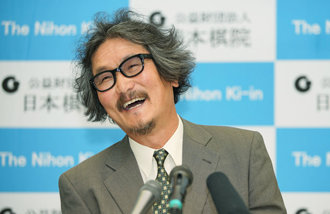Nuclear Materials and Weapons Cannot be Separated Says U.S. Official
Nuclear Materials and Weapons Cannot be Separated Says U.S. Official
Posted March. 29, 2007 07:49,
It is a positive sign that nuclear experts of the U.S. and North Korea agreed to meet and discuss HEU, said director for Asian Affairs at the National Security Council (NSC) Victor Cha during an exclusive interview with Dong-A Ilbo at an international conference held in Georgetown University.
The conference was co-hosted by the Georgetown University, Hwajeong Peace Foundation, and the Ilmin International Relations Institute of Korea University.
The stance of White House is clear. North Korea should acknowledge and report all nuclear programs, he said on North Koreas HEU program. Before Cha joined the NSC at the end of 2004, he worked as a professor at Georgetown University.
The following are the specifics of the interview.
-People say that the Bush administration suddenly changed policies toward North Korea.
That is what everyone is saying, but it is not true. President Bush began an intensive effort for dialogue from September 2006. In fact, North Korea started to pay attention to the six-party talks after it conducted nuclear tests last year, he said.
― But hawks in the Republican Party such as former Undersecretary of State John Bolton are saying that it is undermining principles.
The February 13 Agreement can be compared to a test for testing whether the North is really committed to negotiations. There is a timetable for tasks 30 and 60 days later.
― North Korean Deputy Foreign Minister Kim Kye Kwan said that the county cannot give up nuclear weapons acquired before the normalization of relations between the two countries. Isnt this against the U.S. policy of normalization of relations after dismantlement of nuclear weapons?
The process is clear in the September 19 Agreement in 2005: the process for complete denuclearization and normalization of relations start and finish at the same time.
― During last weeks talks in Beijing, Kim Kye Guan did not come out of his hotel. Do you think the North will keep its promise?
I am not an optimist. The participating parties all have the obligation to carry out the February 13 agreement. There are some frustrating and difficult tasks left. Last weeks issue was the return of $25 million of North Korean funds and related technical problems. Someone seems to have given the wrong advice in Pyongyang.
― Did North Koreas attitude on HEU change after talks between the North and the U.S. on the 5th and 6th?
Nuclear experts between the two countries agreed to meet. This is very positive. Of course, the North could deny that they have HEU. Should this be the case, than we can say that their attitude did not change.
― It is reported that North Korea is trying to distinguish nuclear weapons and nuclear materials.
That is unacceptable. The September 19 agreement calls for complete denuclearization.
― The two Koreas are trying to hold inter-Korean talks. There has been progress in the nuclear negotiations. Would it be okay to say that the obstacles have been removed?
No comment.
― The sign of progress in relations between the North and the U.S. started in January at Berlin. Kim reportedly laughed for the first time at Assistant Secretary Christopher Hills jokes.
That is not true. The Berlin meeting was very businesslike. There were some jokes, but they were not meaningful.
― You were the second in command in the delegation since the six-party talks in last December. Washington experts say that the White House has begun all-out support of the delegation at that time.
The delegation merely carries out the policy decisions made by the president.
―Is there a goal you want to achieve before leaving the White House?
I have been in the White House for more than 2.5 years. I will return to Georgetown University soon (before the end of term for the president).
srkim@donga.com







